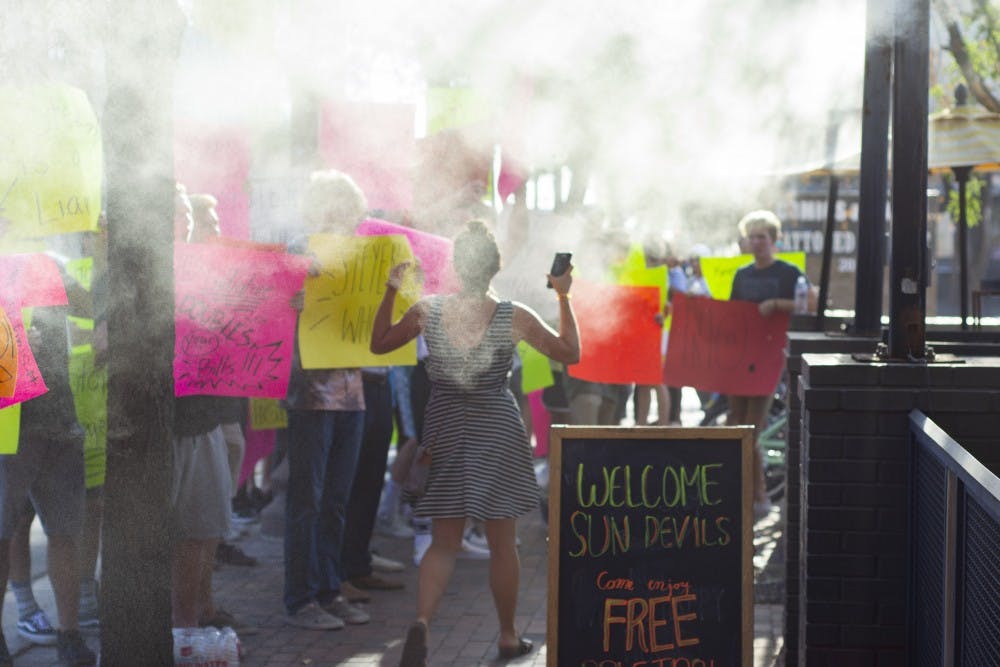At the tail end of last semester, Arizona Governor Doug Ducey signed a law that seeks to protect free speech on Arizona public university and community college campuses.
The law outlines punishments for students who infringe on others’ free speech and prevents universities from trying to inhibit speakers through backhanded methods like security fees. It also created a free expression committee within the Arizona Board of Regents to document free speech violations on each campus and how administrations handle them.
The bill waded into sensitive territory at a time when the extent of free speech on college campuses was being called into question. Perhaps most prominently, students at University of California, Berkeley rioted when conservative firebrand Milo Yiannopoulos announced that he planned to speak at the University, according to The Washington Post. The talk was eventually cancelled.
While free speech is protected under both the United States and Arizona Constitutions, the U.S. Supreme Court has ruled that the time, place and manner of speech can be regulated. The Judicial branch has also determined other restrictions on free speech, especially based on setting.
One of the law's provisions called for ABOR to release a report on campus freedom of speech on Sept. 1.
ASU has not had any major incidents involving free expression, according to ABOR’s report. However, there have been instances in which ASU’s Situational Response Team, a group of staff dedicated to maintaining a safe academic environment, have responded to visitors and inflammatory flyers. Even though the Situational Response Team was dispatched, no free expression was disrupted.
John Arnold, executive director of ABOR and committee chair for the Committee on Free Expression, said free speech is "fundamental to what universities represent and the advancement of ideas on university campuses."
James Weinstein, chair of constitutional law in the Sandra Day O’Connor College of Law, said there is a difference between free speech in a public setting and a university setting and that speech is typically more restricted on college campuses.
“The purpose of free speech in a public setting is the promotion of democracy ... (while) the purpose of free speech on campus is to promote education,” Weinstein said.
Arizona Rep. Paul Boyer, R-Phoenix, sponsored the bill and said he was surprised that it did not garner more support originally.
"Free speech is in the Constitution, and this is something that I think is not partisan that should cut across party lines," Boyer said.
Boyer said another incident at Berkeley inspired him to include a section into the bill that prevents universities from charging guest speakers for security.
“Ben Sharpio ... spoke at UC Berkeley a few years ago and there was no security — didn’t cost the university a dime," Boyer said. "Then the next year he comes back (and) it ended up costing him about $600,000.”
The bill also outlines potential punishments, including "suspension or expulsion," for students who infringe on other's free speech.
ASU has been recognized as a “green light” school since 2011 by the Foundation for Individual Rights in Education, an organization dedicated to defending and sustaining civil liberties and rights at American colleges. ASU was the largest of 14 universities to earn the rating.
This means that ASU's policies protect freedom of speech as defined by FIRE's standards.
Arnold said students will not experience tangible differences on their campus as a result of the law, and that Arizona campuses are a model for other universities in free expression on campus.
“The bill implements what we’re already doing ... they really started in a state where these ideals are already implemented," Arnold said. "The bill sort of memorializes that and then they want to take those ideals and push them into other states.
If students want to invite guest speakers, they must follow ASU's rules and guidelines — ASU requires students to fill out an event registration form and keep in mind several factors: the type of event, purpose of the event, number of attendees expected and budget.
Reach the reporter at mzhao49@asu.edu and follow @michelle_zhao23 on Twitter.
Like The State Press on Facebook and follow @statepress on Twitter.




